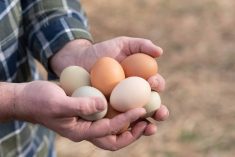The federal government has put a hold on the carbon tax applied to heating oil for the next three years and announced a doubling of the rural supplement in the carbon tax rebate program.
In mere minutes, Ottawa transformed the carbon tax into a negotiable political lightning rod and lent credence to carbon tax critics. The decision to increase rural supplements implicitly acknowledges that the rebate wasn’t sufficient to cover associated costs.
Despite the unpopularity of carbon pricing in some quarters, it is a relatively lesser evil for the economy. However, when it comes to food, the stakes are notably higher.
Read Also

Trade uncertainty is back on the Canadian national menu
Even if CUSMA-compliant goods remain exempt from Trump’s new tariffs for now, trade risk for farmers has not disappeared, Sylvain Charlebois warns.
Since Ottawa has paused the carbon tax for heating oil, a compelling case can be made for examining the impact on our entire food supply.
It is imperative that we conduct a rigourous evaluation of how carbon pricing affects food affordability for Canadians and the long-term competitiveness of our industries.
Unfortunately, comprehensive analyses are lacking. Much of what we’ve encountered appears to be influenced by biased narratives, particularly from organizations like the one-sided Smart Prosperity Institute and Climate Change Centre, which often rely on a limited pool of intellectual activists.
Public discourse surrounding carbon pricing and food affordability has been misdirected. Rather than asking whether the carbon tax is an easy scapegoat for high food prices, the better question is whether the carbon tax negatively impacts competitiveness of our food industry.
Quantifying the direct and straightforward impact of carbon pricing on retail food prices is challenging, if not impossible, given the multitude of factors that influence prices, including consumer behaviour and weather.
Suggesting that carbon pricing has a direct, linear effect on retail food prices would be misleading. Prices fluctuate for various reasons, so our primary focus should be on industrial and wholesale prices.
Our research has revealed a significant contrast between industrial and wholesale prices. Industrial prices are notably more susceptible to cost fluctuations, which unquestionably encompass the influence of carbon pricing. These cost increases within the supply chain are far more quantifiable and trackable.
In recent years, the Industrial Product Pricing Index related to food has outpaced the Consumer Price Index for food prices, a trend that has been largely overlooked.
It appears that carbon pricing has led many to become passive in their assessment of environmental politics, failing to critically question the figures presented.
Recently, the Bank of Canada made claims about carbon pricing that went unchallenged. It estimated that only 0.15 per cent of inflation could be attributed to carbon pricing, but this calculation considered only the direct impact of the carbon tax on three products: gasoline, heating oil, and natural gas.
It did not account for second-round or pass-through effects. It is concerning that not a single reporter questioned how the central bank arrived at this coefficient until Dalhousie University sought this information. It’s as if everyone is sleepwalking.
While outright elimination of the carbon tax is not advisable, a temporary pause on any carbon pricing policies affecting our food supply chain should be considered until we gain a clearer understanding of their impact.
– Sylvain Charlebois is professor of food distribution and policy at Dalhousie University and senior director of the Agri-Food Analytics Lab.















